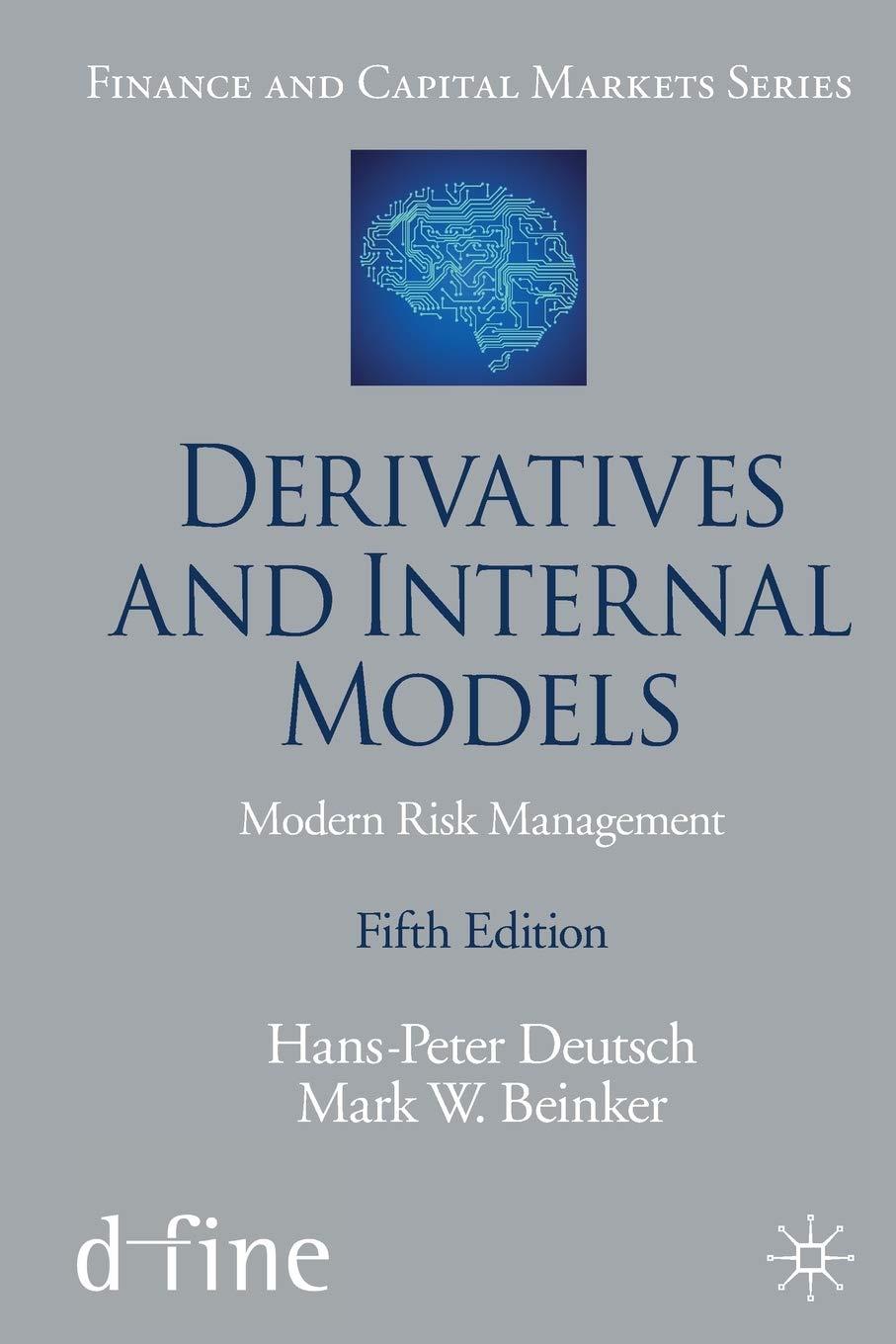Answered step by step
Verified Expert Solution
Question
1 Approved Answer
b. Referring to part a, fit a linear trend model to the data for the years 2006-2008. Then use the resulting model to forecast the
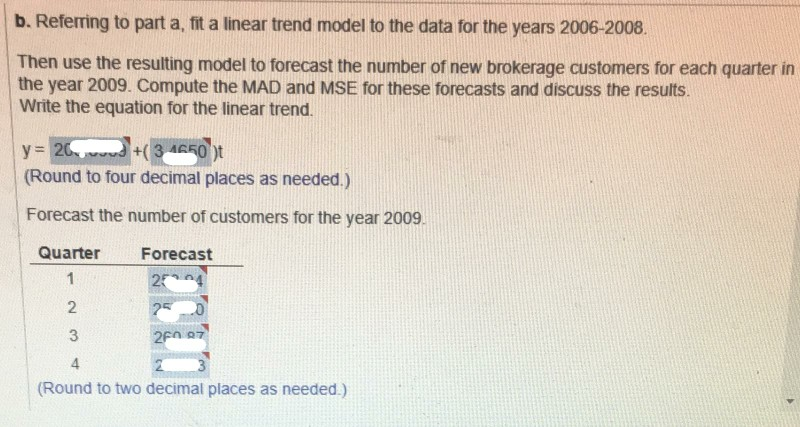
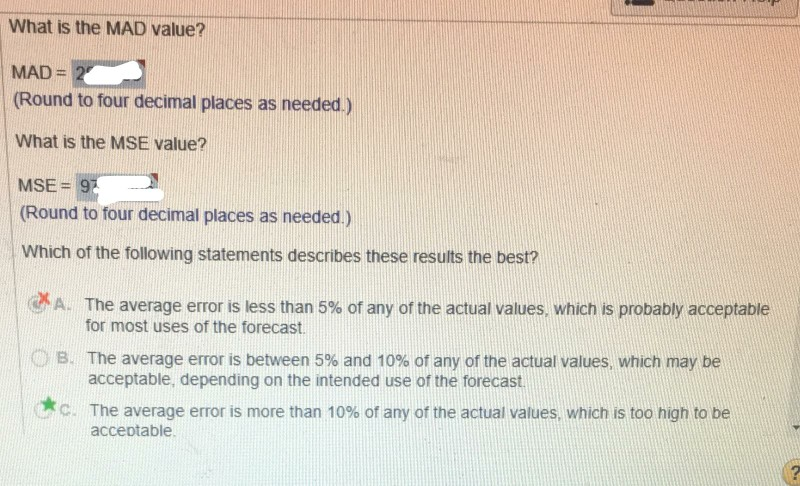
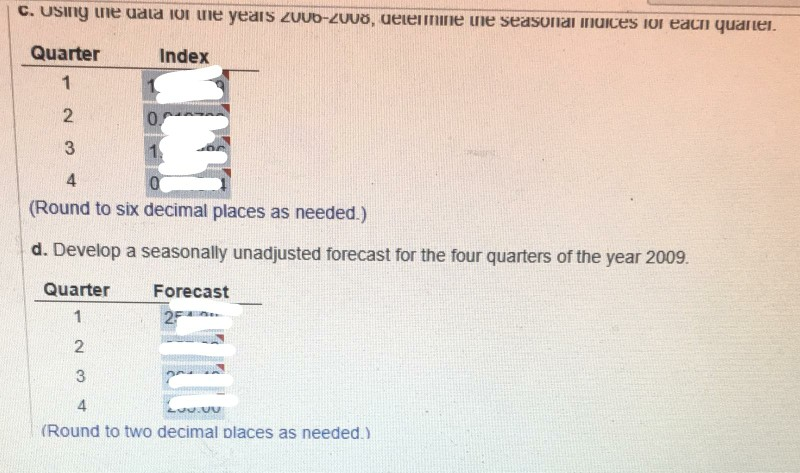
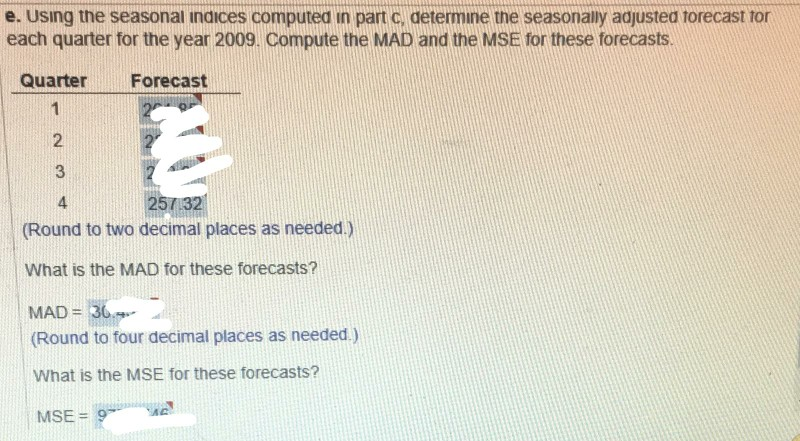

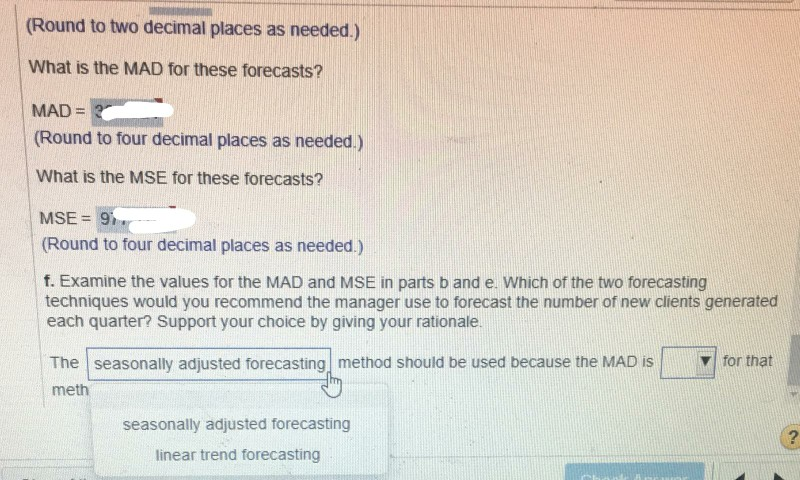
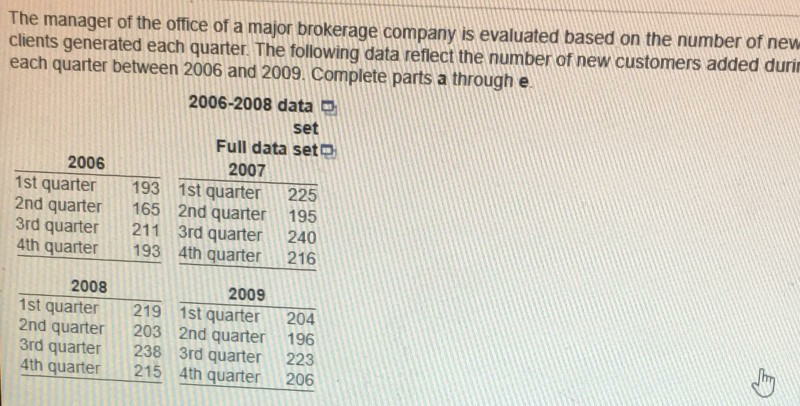
b. Referring to part a, fit a linear trend model to the data for the years 2006-2008. Then use the resulting model to forecast the number of new brokerage customers for each quarter in the year 2009. Compute the MAD and MSE for these forecasts and discuss the results. Write the equation for the linear trend. y= 20 +(3 1650) (Round to four decimal places as needed.) Forecast the number of customers for the year 2009 1 Quarter Forecast 24 2 25 . 3 270 97 4 (Round to two decimal places as needed.) What is the MAD value? MAD = 2 (Round to four decimal places as needed.) What is the MSE value? MSE = 97 (Round to four decimal places as needed.) Which of the following statements describes these results the best? OSA. The average error is less than 5% of any of the actual values, which is probably acceptable for most uses of the forecast. OB. The average error is between 5% and 10% of any of the actual values, which may be acceptable, depending on the intended use of the forecast C. The average error is more than 10% of any of the actual values, which is too high to be acceptable c. Using the ata 101 ne years 2006-2000, deleine me seasonai muices of each quarter. Index Quarter 1 2. 0. INI 3 1 4 0 (Round to six decimal places as needed.) d. Develop a seasonally unadjusted forecast for the four quarters of the year 2009. Quarter Forecast 1 2 2. 3 4 (Round to two decimal places as needed.) e. Using the seasonal indices computed in part c, determine the seasonally adjusted forecast for each quarter for the year 2009. Compute the MAD and the MSE for these forecasts. Quarter 1 Forecast 21 2 3 4 257:32 (Round to two decimal places as needed.) What is the MAD for these forecasts? MAD = 36. (Round to four decimal places as needed.) What is the MSE for these forecasts? MSE = 9 b. Referring to part a, fit a linear trend model to the data for the years 2006-2008 Then use the resulting model to forecast the number of new brokerage customers for each quarter in the year 2009. Compute the MAD and MSE for these forecasts and discuss the results. Write the equation for the linear trend (Round to four decimal places as needed) (Round to two decimal places as needed.) What is the MAD for these forecasts? MAD = (Round to four decimal places as needed.) What is the MSE for these forecasts? MSE = 9 (Round to four decimal places as needed.) f. Examine the values for the MAD and MSE in parts b and e. Which of the two forecasting techniques would you recommend the manager use to forecast the number of new clients generated each quarter? Support your choice by giving your rationale. for that The seasonally adjusted forecasting method should be used because the MAD is meth seasonally adjusted forecasting linear trend forecasting ? The manager of the office of a major brokerage company is evaluated based on the number of new clients generated each quarter. The following data reflect the number of new customers added durin each quarter between 2006 and 2009. Complete parts a through e. 2006-2008 data set Full data set 2006 2007 1st quarter 193 1st quarter 225 2nd quarter 165 2nd quarter 195 3rd quarter 211 3rd quarter 240 4th quarter 193 4th quarter 216 2008 1st quarter 2nd quarter 3rd quarter 4th quarter 2009 219 1st quarter 203 2nd quarter 238 3rd quarter 215 4th quarter 204 196 223 206 b. Referring to part a, fit a linear trend model to the data for the years 2006-2008. Then use the resulting model to forecast the number of new brokerage customers for each quarter in the year 2009. Compute the MAD and MSE for these forecasts and discuss the results. Write the equation for the linear trend. y= 20 +(3 1650) (Round to four decimal places as needed.) Forecast the number of customers for the year 2009 1 Quarter Forecast 24 2 25 . 3 270 97 4 (Round to two decimal places as needed.) What is the MAD value? MAD = 2 (Round to four decimal places as needed.) What is the MSE value? MSE = 97 (Round to four decimal places as needed.) Which of the following statements describes these results the best? OSA. The average error is less than 5% of any of the actual values, which is probably acceptable for most uses of the forecast. OB. The average error is between 5% and 10% of any of the actual values, which may be acceptable, depending on the intended use of the forecast C. The average error is more than 10% of any of the actual values, which is too high to be acceptable c. Using the ata 101 ne years 2006-2000, deleine me seasonai muices of each quarter. Index Quarter 1 2. 0. INI 3 1 4 0 (Round to six decimal places as needed.) d. Develop a seasonally unadjusted forecast for the four quarters of the year 2009. Quarter Forecast 1 2 2. 3 4 (Round to two decimal places as needed.) e. Using the seasonal indices computed in part c, determine the seasonally adjusted forecast for each quarter for the year 2009. Compute the MAD and the MSE for these forecasts. Quarter 1 Forecast 21 2 3 4 257:32 (Round to two decimal places as needed.) What is the MAD for these forecasts? MAD = 36. (Round to four decimal places as needed.) What is the MSE for these forecasts? MSE = 9 b. Referring to part a, fit a linear trend model to the data for the years 2006-2008 Then use the resulting model to forecast the number of new brokerage customers for each quarter in the year 2009. Compute the MAD and MSE for these forecasts and discuss the results. Write the equation for the linear trend (Round to four decimal places as needed) (Round to two decimal places as needed.) What is the MAD for these forecasts? MAD = (Round to four decimal places as needed.) What is the MSE for these forecasts? MSE = 9 (Round to four decimal places as needed.) f. Examine the values for the MAD and MSE in parts b and e. Which of the two forecasting techniques would you recommend the manager use to forecast the number of new clients generated each quarter? Support your choice by giving your rationale. for that The seasonally adjusted forecasting method should be used because the MAD is meth seasonally adjusted forecasting linear trend forecasting ? The manager of the office of a major brokerage company is evaluated based on the number of new clients generated each quarter. The following data reflect the number of new customers added durin each quarter between 2006 and 2009. Complete parts a through e. 2006-2008 data set Full data set 2006 2007 1st quarter 193 1st quarter 225 2nd quarter 165 2nd quarter 195 3rd quarter 211 3rd quarter 240 4th quarter 193 4th quarter 216 2008 1st quarter 2nd quarter 3rd quarter 4th quarter 2009 219 1st quarter 203 2nd quarter 238 3rd quarter 215 4th quarter 204 196 223 206
Step by Step Solution
There are 3 Steps involved in it
Step: 1

Get Instant Access to Expert-Tailored Solutions
See step-by-step solutions with expert insights and AI powered tools for academic success
Step: 2

Step: 3

Ace Your Homework with AI
Get the answers you need in no time with our AI-driven, step-by-step assistance
Get Started


